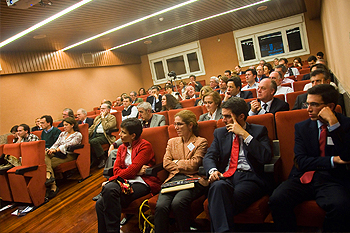2013_11_08_ICS_Conocer mejor el cerebro ayuda a combatir enfermedades, pero no da una respuesta definitiva de qué es el ser humano
"Knowing the brain better financial aid to fight diseases, but it does not give an answer final to what a human being is."
The director of project 'Mind-brain' of the ICS has participated in a discussion at TECNUN, moderated by journalist Andoni Orrantia.
"The research in neurosciences must be framed in a broad vision: knowing more about the brain can help to fight diseases, but it does not give an answer final to what the human being is". This was stated by Prof. José Ignacio Murillo, director of the project 'Mind-brain of the Institute for Culture and Society (ICS), during the presentation of the institute at the School of Engineers TECNUNin San Sebastian. The ICS is a center of the University of Navarra that seeks to offer scientific answers to the challenges of the global world from the Humanities and social sciences.
According to Professor Murillo, neuroscience is one of the fields of research that is currently undergoing most development, which is reflected in initiatives such as the Human Brain Project, which seeks to recreate the human brain, and which he described as "the flagship of the Human Brain Project in Europe". Human Brain Projectwhich tries to recreate the human brain, and which he has described as the "flagship of the research in Europe".
"Neuroscience has a great influence on the image that our culture has of itself. If it is approached with reductionism, it conveys that man has no freedom, that our identity has no consistency, that our relationships are caused by Biochemistry ...", he explained. In this sense, he has opted for an interdisciplinary perspective, which favors dialogue between Humanities and the sciences.
José Ignacio Murillo was one of the three speakers at the discussion held during the event and moderated by ETB journalist Andoni Orrantia. Also participating were Montserrat Herrero, principal investigator of project ', and Ignacio Gómara.Religion and Civil Society'and Ignacio Gómara, researcher of the project '.Education of affectivity and human sexuality'. The three of them have exposed some keys of their work in the ICS.
The 'deep' reasons for today's problems

For his part, Ignacio Gómara pointed out that his line focuses on "facilitating the sexual and affective Education of young people so that they have more complete and positive information, so that their first decisions about sexuality are based on accurate knowledge and are not carried away by the pressure of group".
Also speaking at the presentation in TECNUN was Iciar Astiasarán, Vice President of research of the University of Navarra, who stressed that "society today is at a turning point" and that the academic center is launching initiatives such as the ICS to "address the needs of society from an academic point of view, well-founded and based on a scientific methodology".
Likewise, Jaime García del Barrio, director general of the ICS, emphasized the keys of the high school, in which fifty specialists of 17 nationalities are researching. He referred to the eight lines of research of the ICS, which are grouped into four areas: Contemporary art; Family, Education and society; Globalization, human rights and interculturality; and Poverty and development.
The project 'Mind-brain' of the ICS receives funding from the Obra Social 'La Caixa'.
Obra Social 'La CaixaThe project 'Mind-brain' of the ICS receives funding from the Obra Social 'La Caixa'.






